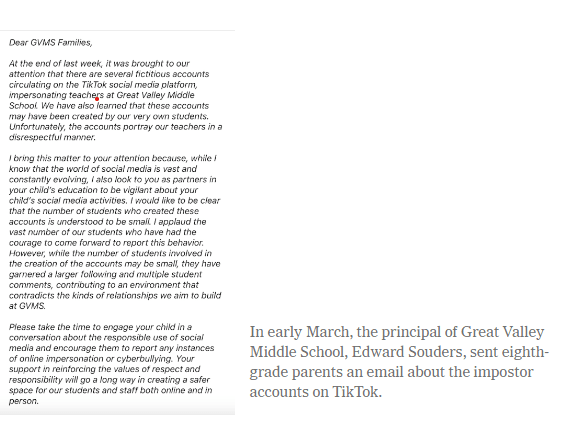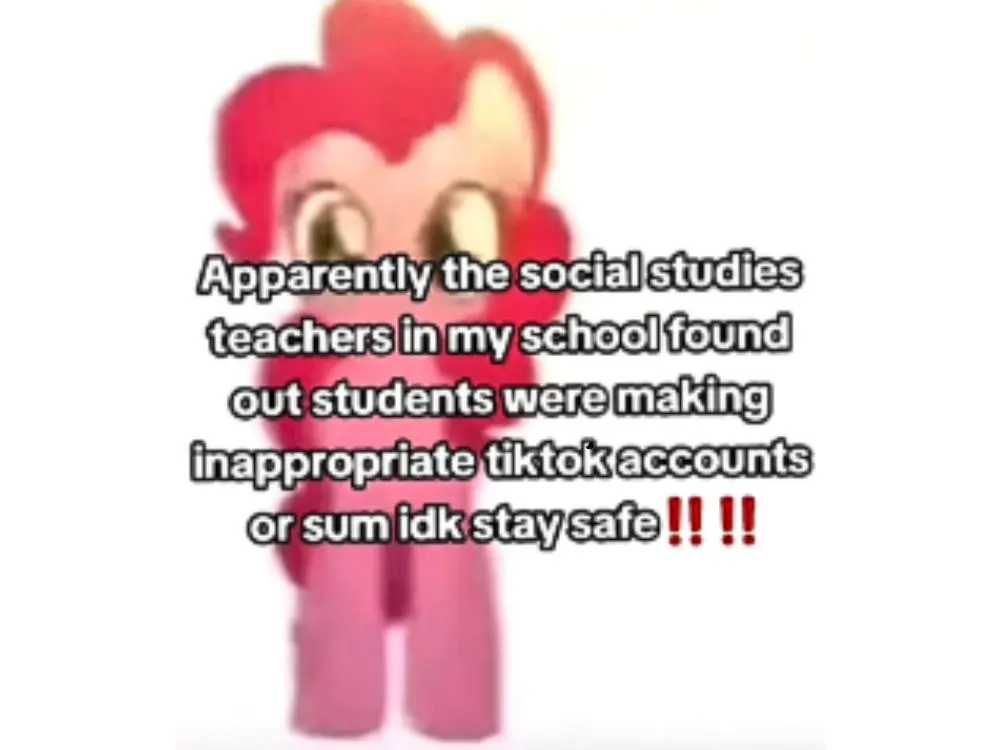In February 2024, a group of students made a bunch of fake TikTok accounts posing as more than 20 of their teachers and school staff members. According to the New York Times, “Seventh and eighth graders in Malvern, Pa., impersonated their teachers with disparaging, lewd, racist and homophobic videos in the first known mass attack of its kind in the U.S.”
Patrice Motz, a veteran Spanish teacher at Great Valley Middle School in Malvern, Pa., was told by another teacher that trouble was coming. She told her that some eighth graders had set up fake TikTok accounts impersonating their teachers. Ms. Motz, who had never used TikTok, created an account to try to see the problem.
Motz found a fake profile for @patrice.motz, which included an actual photo of her at the beach with her husband and their young kids. “Do you like to touch kids?” text in Spanish over the family vacation photo asked. “Answer: Sí.”
Motz said she felt “kicked in the stomach” that students would so casually try to destroy their teachers’ lives and families. Motz has taught at the middle school in an affluent suburb of Philadelphia for 14 years. “It was so deflating,” she said. “I can’t believe I still get up and do this every day.”
More Than 20 Teachers Targeted
In the days that followed, 20 teachers— about one-quarter of the school’s faculty — discovered they were also victims of fake teacher accounts which included innuendo of pedophilia, racism, homophobia, and made-up sexual encounters among teachers. Hundreds of students soon viewed, followed, or commented on the made-up accounts.
Students took pictures from the school’s website, copied family photos teachers posted in their classrooms, and found others online. They made memes by cropping, cutting, and pasting photos, then superimposing text. While not as sophisticated as some recent “deepfakes” students have made of their teachers, the harm was still great.
While some of the videos made fun of things that teachers often say in class, they also posted a collaged photo with the heads of two male teachers pasted onto a man and woman partially naked in bed.
Students also targeted Mr. Shawn Whitelock, the faculty adviser for the school’s student council for years. A fake @shawn.whitelock account posted a photo of Mr. Whitelock standing in a church during his wedding, with his wife mostly cropped out. The post named a student council member, implying the teacher had wed him instead. “I’m gonna touch you,” the impostor later commented.
“I spent 27 years building a reputation as a teacher who is dedicated to the profession of teaching,” Mr. Whitelock said in an interview. “An impersonator assassinated my character — and slandered me and my family in the process.”
Mrs. Scibilia said a student had already posted a graphic death threat against her on TikTok earlier in the school year, which she reported to the police. The recent impersonations increased her concern.
“Many of my students spend hours and hours and hours on TikTok, and I think it’s just desensitized them to the fact that we’re real people,” she said. “They didn’t feel what a violation this was to create these accounts and impersonate us and mock our children and mock what we love.”
A few days after learning of the videos, Edward Souders, the principal of Great Valley Middle School, emailed the parents of eighth graders, describing the impostor accounts as portraying “our teachers in a disrespectful manner.”
While the attack isn’t a unique occurrence, what makes it unprecedented is the fact that several kids were involved and the amount of teachers who were targeted. “It’s a significant escalation in how middle and high school students impersonate, troll, and harass educators on social media. Before this year, students largely impersonated one teacher or principal at a time.”
Educators everywhere are concerned that social media has led to an alarming lack of empathy in students. “Social media has helped normalize anonymous aggressive posts and memes, leading some children to weaponize them against adults.”
Consequences or Lack Thereof?
The Great Valley School District said it has taken steps to address “22 fictitious TikTok accounts” impersonating teachers at the middle school. It described the incident as “a gross misuse of social media that profoundly impacted our staff.”

Last month, two female students at the school publicly posted an “apology” video on a TikTok account using the name of a seventh-grade teacher as a handle. The pair, who did not give their names, described the fake videos as a joke and said teachers had blown the situation out of proportion. In other words, they did not understand the impact of what they had done in the least. They added, “We never meant for it to get this far, obviously,” and one of the students said, “I never wanted to get suspended.” It seems she is more upset that she got caught than the fact that she committed the act. The other student in the video said, “Move on. Learn to joke. I am 13 f—ing years old,” she added, “and you’re like 40 going on 50.”
A spokeswoman for TikTok said their guidelines “prohibit misleading behavior, including accounts that pose as real people without disclosing that they are parodies or fan accounts.” TikTok said they use a U.S.-based security team to validate ID information—such as driver’s licenses—in impersonation cases and then delete the data.
TikTok’s Response
The teachers reported the impostor accounts to TikTok but have not heard back. Several teachers, who felt the videos had violated their privacy, said they did not provide TikTok with a personal ID to verify their identities. Just this week, TikTok removed the account impersonating the head of the teachers’ union and three other fake Great Valley teacher accounts flagged by a reporter, but the others remain.
The school district said it had limited options to respond. “Courts generally protect students’ rights to off-campus free speech, including parodying or disparaging educators online — unless the students’ posts threaten others or disrupt school.”
The Superintendent’s Response
“While we wish we could do more to hold students accountable, we are legally limited in what action we can take when students communicate off campus during nonschool hours on personal devices,” Daniel Goffredo, the district’s superintendent, said. The district couldn’t comment on disciplinary actions to protect student privacy.
While a few accounts disappeared, including those using the names of Ms. Motz and Mr. Whitelock, others popped up. In May, a second TikTok account impersonated Mrs. Scibilia, the head of the teachers’ union, and posted several videos mocking her.
The same students who created many of the fake accounts recently posted new videos saying that from now on, they would make their videos private so that teachers and administration couldn’t find them. Seemingly, no lessons were learned, and the same behavior will continue unchecked.


James
Monday 8th of July 2024
"“While we wish we could do more to hold students accountable, we are legally limited in what action we can take when students communicate off campus during nonschool hours on personal devices,” "
Two things... 1) I wonder if this is what the Supreme Court had in mind when they ruled on the Levy case. 2) I am skeptical of this. This sounds like what administrators say when they don't want to deal with a problem. The school suspended the students. If they can do that, they can also expel them. Also, defamation is not protected speech.